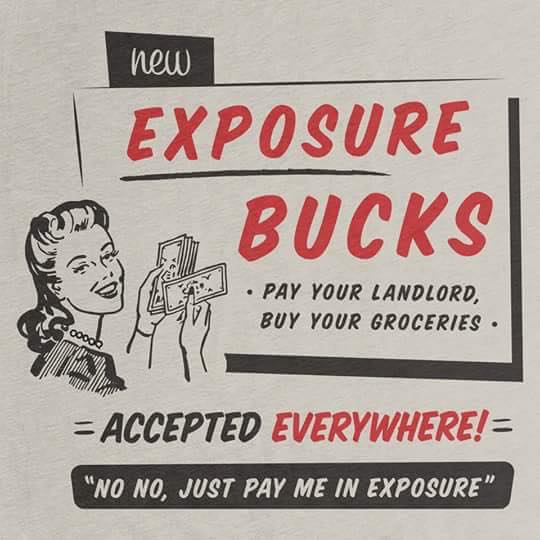“If you want to take an author’s hard work, and then use it to generate a profit, but you are not willing to pay that author in any way, shape, or form besides allowing them to sign their name to the piece, then you are exploiting that author. Pay them by the word, share your ad revenue, and by all means try to get a good deal on the work, but do not simply swipe it, post it online, and then roll around in the money like some kind of political cartoon.”

This terrific quote comes from Neal Litherland’s blog The Literary Mercenary, which is an awesome blog name I wish I’d thought of using. It’s drawn, of course, from the ongoing discussion about paying authors, as if that’s such a radically bizarre concept that we just started questioning whether people should be paid for their work.
I’ve seen Uncle Harlan’s famous “Pay the Writer” clip from Dreams With Sharp Teeth about twenty times in these discussions, because it’s exactly on point. As Harlan says: do you pay the cameraman? Do you pay the guys who schlep the merchandise on and off the trucks? Then you also need to pay the writer, because that’s where your whole project starts. We never question whether a book should cost money, or whether the paper and printing of that book should be a cost of doing business for that publisher… so why do we think the words on the page should magically appear for free?
And writers need to stop giving it away. As Harlan says, the amateurs make it hard for the professionals, because they’ll do it all for free, and then no one can make a living. Why should HuffPo pay Wil Wheaton for his excellent column, when they can get some desperate sad sack to do write a lesser column “for the exposure”?
And they will have no difficulty finding that sad sack, because we have been conditioned to think that words mean nothing and the writer’s talent is worthless, so just be happy someone wants to read you. We are conditioned to think that writing is free, and thus writers die of exposure.
I’ll add this to it, because I think there are some well-meaning (if naive) people creating anthologies and magazine projects “for the love” who are not cartoon villains. They see “for the love” anthos posted everywhere, they may have been published in a few themselves, and they truly believe in their project and want it to fly. They may feel defensive, even attacked by this discussion of paying writers, simply because the state of the industry has devolved to such an extent it never occurred to them that paying the authors was not optional. Hell, I’ve done it myself, and regret it.
You’ve seen the posts, folks. You’re on Facebook, cruising through a number of antho calls for dark fantasy noir thrillers about unicorns in a neo-Gothic setting and you see a terrific story call, one that perfectly fits your unicorn story. “This is a For The Love project, but we hope to be in a position to start paying our authors really soon!”
Skip.
To be fair, there’s a good bit of this in nonfiction, too. I’ve gotten offers to write a regular column in line with my day job, and I’ve turned them down because it’s always, “We can start with two columns a week, and if it develops an audience, then we can see about paying you.”
No. I don’t work for free, and neither should you.
Here is the hard truth, folks: if you care about the project you’re developing, if you care about the art, you are ethically required to work author pay into your budget from the start. Don’t say “we hope to start paying authors as our project grows.” Don’t say “we will pay authors a share of the profits after we make back our expenses.” Start from the philosophy that you have to pay the authors and artists, just as you have to pay for the printing, layout, ebook conversion, web hosting service, postage, ad space and anything else that comes with producing your project.
Authors come first, not last. If you don’t have the money to pay the authors, you don’t have the money to do the project.
That doesn’t mean it’s dead. It means you have to work harder. Kickstart that baby, create a Patreon or some other preorder/crowdfunding mechanism. Raise the cash for upfront payments and plan to pay royalties to your writers. It doesn’t have to be a lot – no one ever paid a mortgage solely on short story revenue. SFWA pro rate is 8c a word for fiction; HWA rate is 5c, but flat fees still count as payment, albeit token.
The simple fact of paying the writer for their words shows that you deem those words to be of value. If you don’t value the words enough to pay their creators, how can you expect anyone else to value your project? And if you, the writer, give away your work for nothing, how can you expect the next editor will decide you’re worth paying?
Value yourself, value the work. Pay for what you get, and insist on the same in return.
Elizabeth Donald is a freelance journalist, editor, author, photographer, grad student and instructor, as well as the manager/zookeeper of the Literary Underworld. In her spare time, she has no spare time. Find out more at donaldmedia.com or elizabethdonald.com.
